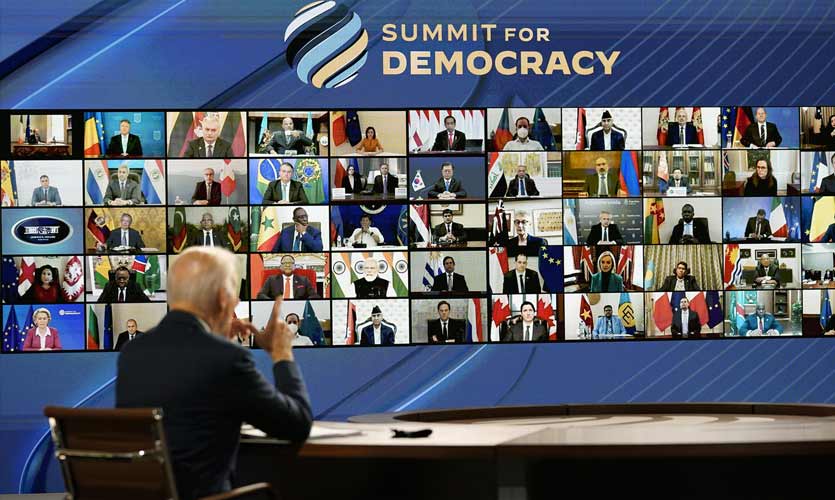On Thursday, President Joe Biden hosted more than 100 countries for a democracy summit that has provoked criticism from both China and Russia. The event, held through a video link due to the coronavirus pandemic, was aimed at presenting the US as the leading force driving countries out of the existential struggle between democracy and autocracy.
President Biden inaugurated the two-day summit, which was attended by representatives from some 100 governments, NGOs, businesses, and philanthropic organisations. Nevertheless, Biden continues to face a challenge to US democratic norms from Donald Trump and his attempt to overturn the 2020 election that provides a troubling backdrop for the summit.
Tensions had erupted even before summit attendees could meet when conflict arose over who should be on the list. Chinese and Russian autocrats, whom Biden sees as champions of the autocrat camp were notably omitted, leading them to say this stokes the ideological rift.
In response, officials and pundits had gathered in Beijing and online to suggest that China’s political system is actually a high-functioning democracy of a different variety, and that it delivers better results for its people than the US. Analysts say that the talks were part of a propaganda campaign aimed at showing that China is equal to the US, and rebutting the suggestion that the Chinese system is inferior to those of the democracies that President Biden is bringing together.
“No country has the right to judge the world’s vast and varied political landscape by a single yardstick,” wrote ambassadors Anatoly Antonov of Russia and Qin Gang of China in a joint essay last month.
Furthermore, the Biden administration has invited Taiwan, a democratically governed island that mainland China considers part of its territory even though it is not under its control. As part of an effort to protest human rights abuses, including the “mass genocide” of the Uyghur Muslims in Xinjiang, the Biden administration also announced this week that diplomatic officials from the US would not attend the Beijing Winter Olympics in February 2022.
The diplomatic boycott has been joined by Australia, Britain, and Canada, although their athletes will compete as usual. The Russian government has joined China in criticising the decision. Excluding other countries from the summit because of human rights abuses or vote rigging hasn’t been easy. Pakistan and the Philippines, for instance, were invited, but Hungary’s nationalist government representative was not. However, Pakistani PM Imran Khan will not be attending the summit. “We remain in contact with the US on a range of issues and believe that we can engage on this subject at an opportune time in the future,” said Pakistan’s Ministry of Foreign Affairs. Jair Bolsonaro, the right-wing president of Brazil was also invited, but Turkish President Recep Tayyip Erdogan was shunned.
India, Maldives, and Nepal were also invited to the summit at the White House. According to Freedom House, Pakistan and the Maldives are among the lowest-rated democracies in the region, and India has been downgraded to “partially free”. Bhutan and Sri Lanka, which are not exemplary democracies but rank higher on the Freedom House index, were not invited.
Read more: Putin Calls India A ‘Time-Tested Friend’, Signs 28 Deals
It isn’t clear how the Biden administration selected the countries, but it does appear to have invited countries that could serve its current interests. The region already viewed the summit cynically, and despite its focus on democratic values, the invite list reflects the US’ political and economic agendas.
The summit accorded special treatment to Indian Prime Minister Narendra Modi. He spoke to a plenary meeting of only 12 people about Indian democracy, and will give an official address on Friday. Those who want India to play a larger role on the world stage may take pride in Modi’s participation. Critics point out, however, that he has presided over the most major crackdowns on democracy at home.
Modi’s participation in the summit has created some unease within India itself. The fear is that India’s democracy record will be “scrutinized”. Others, including at least one senior leader of the BJP, are uncomfortable with New Delhi participating in a democracy promotion event sponsored by Washington, given the United States’ own struggles with democracy.










